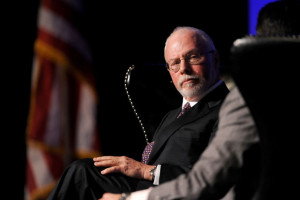Iranian President Mahmoud Ahmadinejad’s trip to Lebanon this week has produced much teeth gnashing by Iran-hawks who note that Hezbollah’s ties to Iran and see Ahmadinejad’s upcoming outing to the Lebanon-Israel border as a grave provocation.
Reza Kahlili, a former CIA spy in the Iranian Revolutionary Guard who writes in hawkish publications under a pseudonym, wrote in today’s Washington Times that (with my emphasis):
President Mahmoud Ahmadinejad’s visit to Lebanon today marks not only a historic point for the Islamic regime in Iran but also its victory over Israel and the West in gaining control of Lebanon. This reinforces for the Iranians that their philosophy of radicalism and strategy of terrorism have big payoffs.
David Pryce-Jones said, in his National Review blog, that (again, my emphasis):
Ahmadinejad is now in Lebanon, and the contrast between the rational and the irrational in his conduct comes into play. Iran has financed and armed Hezbollah to the point where it is now the decisive factor in the country’s political existence. Institutions representing other national or religious elements are effectively at the mercy of Hezbollah and Iran. By means of this proxy, Ahmadinejad is in a position to launch war or civil war, or simply to take over the country in partnership with his sidekick Syria at a moment of his choice.
Pryce-Jones concludes with a rather ominous sounding but vague suggestion that if Ahmadinejad decides to travel to the Israeli border and throw a stone, as has been rumored, “[i]t may even be more destructive just to laugh at the man and his preposterous fantasies than to send some F-15s over at ground level” — which could reference either buzzing Ahmadinejad (a low altitude flyover) or an attack (an assassination attempt).
Whatever Pryce-Jones is suggesting by sending “some F-15s over at ground level” sounds like a sure-fire way to start a war. But that shouldn’t be so surprising coming from a man who last year suggested that President Barack Obama and Secretary of State Hillary Clinton should demand American journalist Roxana Saberi’s release and “impose whatever sanctions will harm Iran, and maybe dispatch a fleet if only as a show of strength.” (Saberi was ultimately released without a military showdown in the Persian Gulf.)
Commentary executive editor Jonathan Tobin warns that Ahmadinejad is gaining dangerous confidence in his ability to flout sanctions while he receives a “triumphant tour” in Lebanon and meets with Turkish Prime Minister Recep Tayyip Erdo?an on Friday, who Tobin is quick to point out is the prime minister of a U.S. trading partner and NATO ally.
Tobin concludes (my emphasis):
With the cheers of his Lebanese allies and the sweet talk from Turkey still ringing in his ears, it would be understandable if Ahmadinejad concluded that he has once again bested Obama. But as troubling as this diplomatic triumph for Iran may be, the confidence it may have engendered in the Iranian regime is something that ought to scare the Middle East and the rest of the world. An Iranian government that thinks it cannot lose in a confrontation with America, Israel, or the West is one that is liable to do anything if challenged. The consequences of such a mindset may be incalculable.
Judging from the hawks, Ahmadinejad’s travels this week are the capstone on his crusade to colonize the greater Middle East.
Rami Khouri, writing in Beirut’s Daily Star, offers a more restrained analysis of Ahmadinejad’s trip. He acknowledges that the trip hits on both Western unhappiness with the strength of the Iranian-Hezbollah link, widely seen as part of a resistance movement which refuses to take orders from the West, and Arab concerns that an Iranian-Hezbollah connection challenges Sunni Arab power in the Middle East.
But Khouri questions the real implication of this week’s trip and concludes (my emphasis):
So at some levels it is understandable why so many people in the region and abroad are making a lot of noise about the Iranian president’s visit to Lebanon. At another level, though, that of substance vs. symbolism, this is a pretty routine event that does not necessarily break new ground, but mainly reflects and emphasizes existing political realities that generate frenzied, nearly hysterical, reactions on both sides.





The Hawks are just pissed because nobody heaved a shoe at Mahmoud, as someone did when Bush made one of his “triumphal” tours of Iraq.